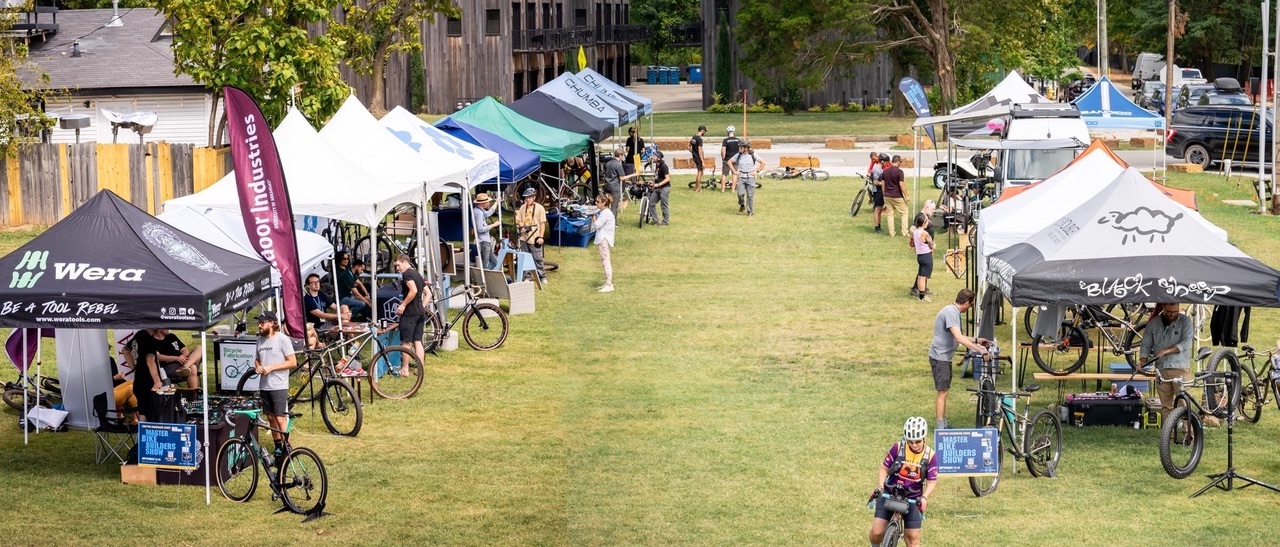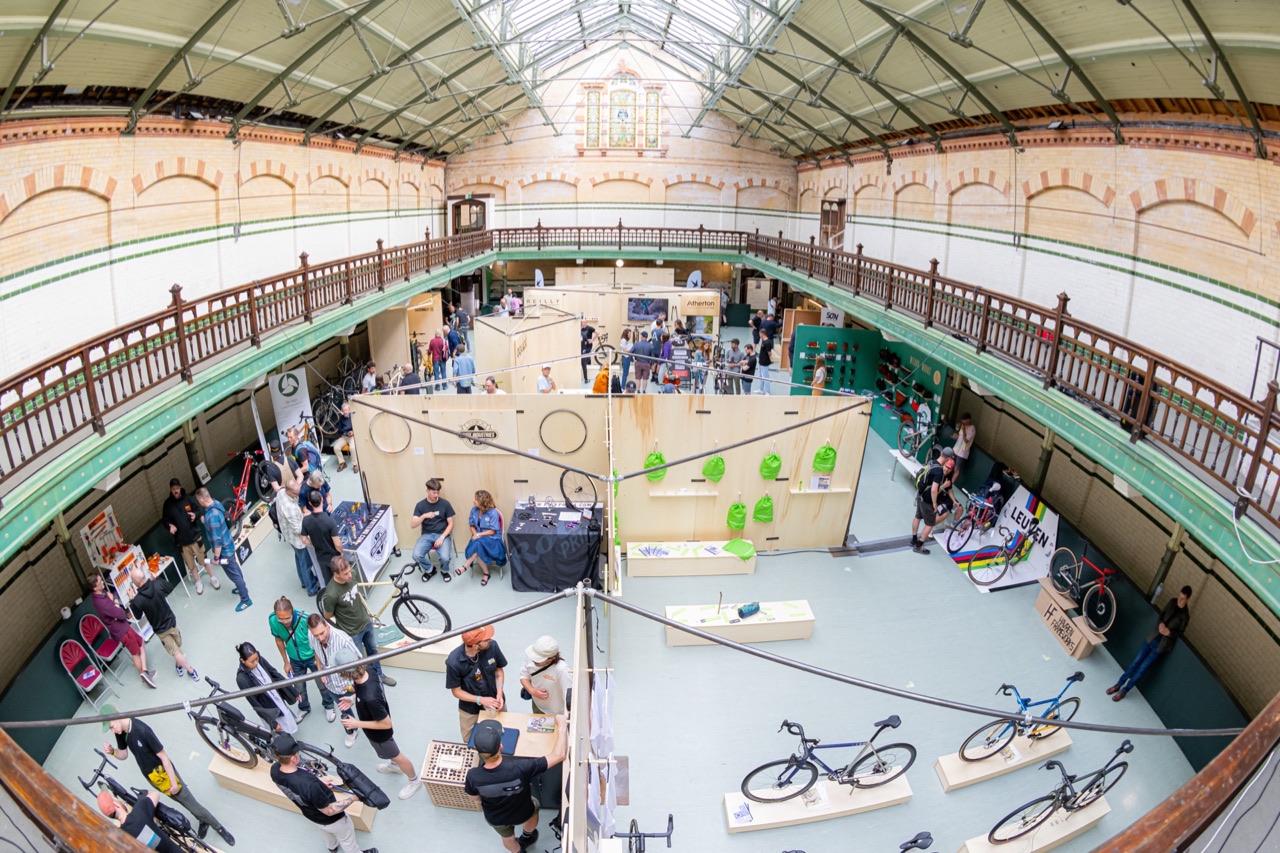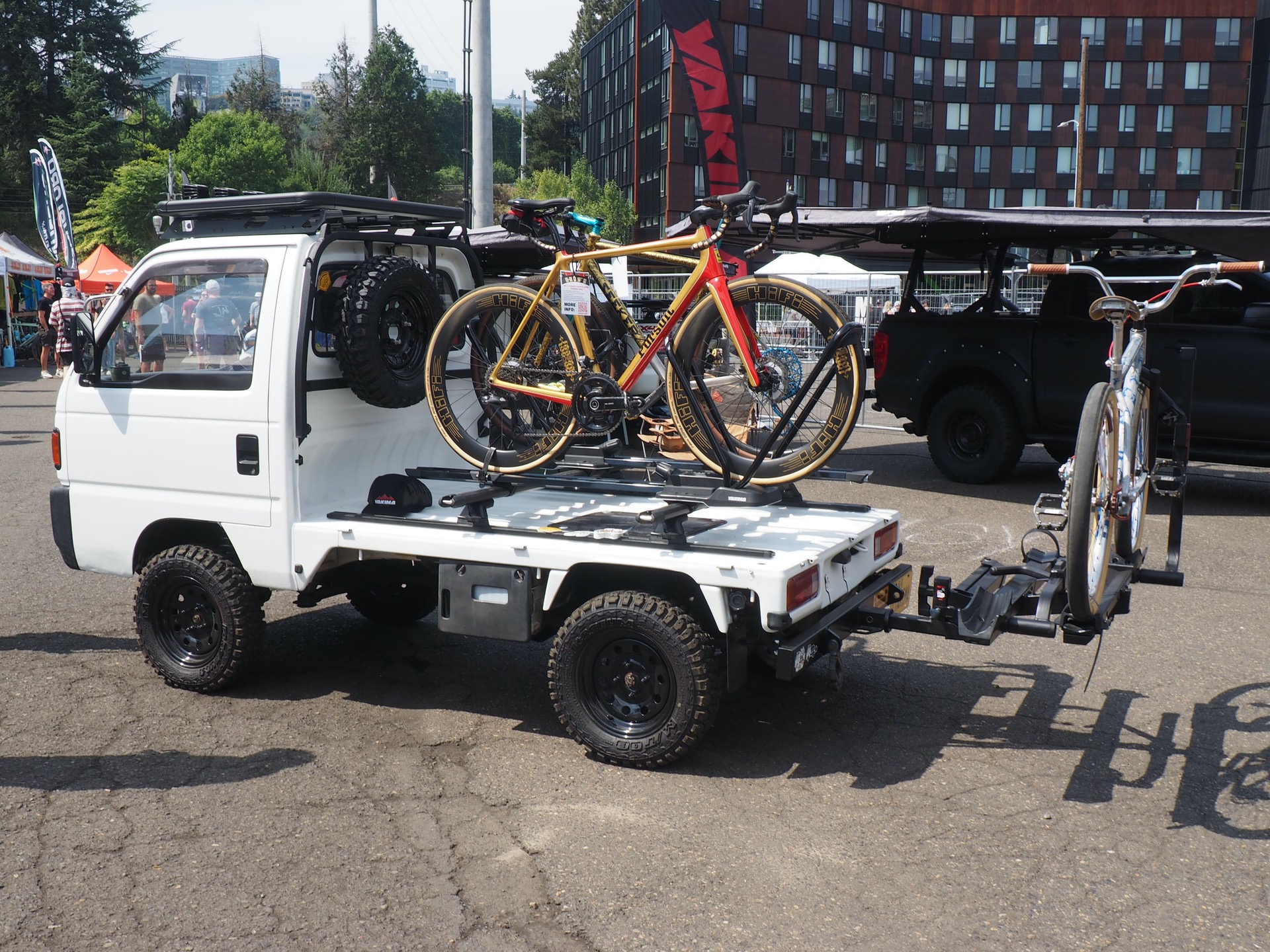Master Bicycle Builders Show 2024
Year Two for the Master Bike Builders Show, in Bentonville, Arkansas went very well. Located in a small park at the head of a well-used cycling trail, a steady stream of cyclists visited this outdoor show throughout the weekend of September 14-15. Exhibitors enjoyed the quality time they got to spend with potential customers, and organizer Sergio Bravo is already making plans for the 2025 event.

Bentonville, Arkansas, has been dubbed the Mountain Bike Capital of the World. Whether or not this lofty title is self-anointed is a matter of some debate, but make no mistake about it: Bentonville is the real deal. There are 500 miles of mountain bike trails alone, and also trails suitable for gravel bikes as well as a 30-mile paved greenway that stretches south to Fayetteville, home of the University of Arkansas. There are 17 bike shops or bike rental businesses within the city limits of Bentonville, an incredible number for a city of 50,000 residents.
Bike culture permeates Bentonville, and so it was a natural setting for the second annual Master Bike Builders Show. Promoter Sergio Bravo has a background in marketing in the bicycle industry, and he wants to create something new and different from other bike shows. He’s largely succeeded in this goal, by using an outdoor location right next to a trailhead in downtown Bentonville. Cyclists who were about to start their rides, or who had just finished made their way over to the MBBS venue, and like the trails themselves, there was no charge to enter.
At the MBBS, we saw “Keepers of the Flame” of bike tradition such as Dean Wright of Wright Cycles, who apprenticed with legendary framebuilder Tom Teasdale and who features TA Cyclotouriste cranksets on his bikes (candy for the eyes of this aging GenX-er) sitting next to newer innovative builders such as Viral Cycles, based in the greater Bentonville area after relocating from Bend, Oregon.
At the other end of the spectrum was the relatively low-cost carbon fiber frame from Brackish that uses 3D aluminum lugs; and the delightful innovative KillerDrop adjustable seat angle mechanism.
Here is a review of this year’s show:
Killer Drop
One of the most interesting designs in the venue was the Killer Drop seat height and angle adjuster. One button press allows for this on the fly. In the down position the seat nose tilts up, and in the up position the nose tilts slightly down, both of which will be music to the ears of people who regularly ride in steep terrain. Additionally, the Killer Drop system slackens the effective seat tube angle with the seat in the dropped position, whereas a dropper post increases the gradient.
Chris Killer is a mechanical design engineer, who learned frame building to make the prototype for his seat level system. He stresses he’s a designer, not a frame builder, so we’re not looking at his unfiled fillets, although he gets brownie points for nailing the geometry and alignment of this complicated frame design first time around (Chris learned frame building because he thought it would take a few iterations to get the frame right). It took three iterations to get the tension bar stiff enough to not rattle against the frame tubes.
Chris says he has several hours already on this bike in the steep terrain near Laguna Beach in southern California, and is very pleased with the performance of his Killer Drop system. HBG will have more on this interesting design in the coming weeks.
Chumba USA
Austin-based builder Chumba work with both steel and titanium. They focus on bikepacking and gravel bikes, along with traditional hardtail and some drop-bar mountain bikes. The Terlingua steel endurance gravel/bikepacking rig, like all Chumba bikes, features adjustable stainless steel rear dropouts from Paragon Machine Works that allow the rider to fine tune the geometry as needed for terrain conditions or tire width. It will fit either 1x or 2x drivetrains and tires up to 50c wide. The Terlingua’s titanium brother is the lighter weight Terlingua SL, built from double-butted titanium tubing, and it features more aggressive geometry suitable for gravel racing. It also comes with ENVE’s In-Route system, a package of integrated handlebar, stem and headset that hide cables and wires. The Terlingua SL has a rear port for the wires to exit, keeping them out of the wind and providing a sleek, minimalist overall look for the bike.
Brackish Cycles
Brackish owner Austin Garner draws on the minimalist methodology of Henry Ford (minus the mass production ethic) for his handbuilt bikes: He produces one model, an all-terrain, go-anywhere steed he calls the Clay. The laudable overall goal of Garner’s singular model focus is to keep the price of his custom handbuilt bikes affordable. “I can provide all the advantages of custom carbon bikes without the hassles and cost of custom carbon,” Garner says.
The Clay features high-modulus carbon fiber tubes bonded to aluminum lugs - a design reminiscent of the early Italian Alan and French Vitus carbon tube models of the 1980s. In the 40 years since these pioneering examples were introduced, both materials and construction techniques have evolved, and Garner, who has a background in product design, has his finger firmly planted on the pulse of contemporary best practices. Brackish is based in the college town of Ithaca, New York, where Garner’s wife is pursuing graduate studies at Cornell University. The inspiration for the Clay came from a trip Garner took from Pittsburgh, PA to Washington, DC on the Great Allegheny Passage and C&O Canal trails, with their shifting trail surface materials and conditions.
Wright Cycles
Wright are based in Moline, Illinois, a city in the upper Mississippi River valley. Namesake owner Dean Wright started building in the mid-1980s with noted Iowa builder Tom Teesdale. “My role was as the finisher of these handbuilt fillet-based frames,” says Wright. “We were producing as many as 25 frames a week,” he says.
After his early apprenticeship, Wright went back to University for a degree in Manufacturing Engineering and began a career in product development - both inside and outside of the bicycle industry - that included a stint at Burley Design in Oregon. As his product development days came to an end, Wright opened Wright Cycles, a full-service bike shop in Moline. He builds in the back of the store in a small workshop with “small batch” production of about 6-12 frames of a given design. One of his signature designs is called the “Mini-Velo”, a compact fillet-brazed steel frame and fork with 20-inch wheels that Wright describes as having all the advantages of a full-size bike with added maneuverability and comfort. Mini-Velos are outfitted with flat bars and thumb shifters and feature some component gems of yesteryear, such as French TA cranksets and Campagnolo Rally long-cage rear derailleurs.
Wan Gerin
Noah Wangerin started building frames, as many Midwesterners do, at famed Michigan framebuilder Doug Fattic’s workshop back in 2013. “All I wanted to do was to build myself a bike to ride,” he says. Having duly accomplished that, he went on to apprentice with fellow UI-Chicago design professor and cycling enthusiast Dan Schaumann of Pachyderm Cycles, sharing workshop space in the Chicago Bubbly Dynamics co-op.
When a customer approaches Noah Wangerin about a bespoke design bicycle, that’s what they will at the end receive. There are no prevailing design or component spec trends, with the possible exception of steel tubing, which is Noah’s medium of choice. Some bikes will have lugged construction, others fillet brazing, and the permutations unfold regarding wheel sizes, flat or drop bars, rim or disc brakes, paint colors, etc.
Corvid Cycles
Chad Corbin builds beautiful bespoke titanium bicycles in the cycling hotbed of Boulder, Colorado. Corvid offer a variety of frames for different riding styles, but they do gravitate towards off-road disciplines. All Corvid bikes feature aerospace grade 3Al-2.5V CWSR (cold worked stress relieved) titanium tubing and they source all of the frame fittings and tubing from domestic producers whenever possible. The tubing diameters and thicknesses for each frame are individually selected based on the intended rider’s weight, frame size, and riding style. The bikes he showed us at MBBS all featured Pinion Smart-Shift drivetrains, which Corbin believes is the future standard for the industry.
“My build process requires a little extra time and expense, but I think the extra effort pays back in the long run,” says Chad. A custom builder with advanced degrees in engineering, Chad also has a strong commitment to diversity, equity and inclusion in the bicycle industry and backs up this sentiment by donating thousands of dollars each year to non-profit organizations and foundations that support these aims.
Magnolia Cycles
Magnolia Cycles has been based in Bentonville’s neighboring town of Rogers, Arkansas, since the return of Michael Crum to his home state after founding Magnolia in Memphis, Tennessee. Michael brought his frame building business to Bentonville because of the the burgeoning cycling culture of the area. Michael combines his technical background as a bike mechanic with his education and background in fine arts to produce frames with a finely-tuned aesthetic sensibility. There was an array of bikes in his booth, including a full suspension MTB frame, and a fillet-brazed road bike currently-popular geometry (pictured below), but Magnolia was the only company at this year’s MBBS to display a full-on, classically-designed road bike with a non-sloping horizontal top tube and a cyclocross bike with (gasp) cantilever rim brakes, Magnolia displays a reverence for tradition without any of the stuffiness that sometimes accompanies it.
The first step to becoming a Magnolia client is to have a full interview and fitting with Crum, who selects tubing and creates designs with the information he gathers from this initial consultation. He views the frame building process through the lens of this dynamic relationship with the bike’s future owner. “I develop a rapport with each customer through my frames, building a personal relationship to determine the client’s needs and aspirations for the bicycle. By primarily working with hand tools in steel, I foster an intimate relationship with each frame and possess the freedom to build a bike suited to the wishes and needs of the individual. This also allows me to exercise my desire for tactile and sculptural creation,” says Crum.
Black Sheep
James Bleakly of Black Sheep Bikes made a splash on the custom geometry scene when he first attended NAHBS in 2008. By then he already had 10 years' frame building experience working with steel and titanium under contract for companies such as Da Vinci Designs, and Dean Bicycles, and since then his efforts have been focused entirely on the Black Sheep brand.
Based in Fort Collins, Colorado, every frame from Black Sheep is custom-designed: they offer no stock or standard frames. By now numerous former interns and staff members, having gained an education in the Black Sheep workshop, have gone out on their own. For James, experienced as he is, the learning continues, as does his enthusiasm for teaching the craft of frame building.
Viral Bikes
Viral Bikes owner Steve Domahidy understands the leap of faith that any new bicycle purchase involves. That’s because Domahidy, a bike designer for a number of brands including Niner, made his own leap of faith in moving from Bend, Oregon to the nascent and evolving cycling mecca of Northwest Arkansas a few years ago to start Viral Bikes. Viral was the only builder at MBBS to have demo bikes for potential buyers to try out on the trails right next to the venue in downtown Bentonville, which shows their own strong faith in their products’ design and build integrity.
As with Corvid Cycles, Viral Bikes are all-in on the Pinion gearbox design and the advantages it offers to the rider. “The derailleur is the dodo bird of mountain bike technology,” writes Domahidy at the Viral Bikes website. “It’s been around awhile, and will likely continue on for a few years, but it’s antiquated and it’s time for it to go extinct.” It’s fair to believe that his words are prescient, since Domahidy played a role in the introduction of 29” mountain bike wheels and their continuing dominance in this market segment.
H4RM Components
While we often focus on bicycle frames in the handbuilt bike industry, it’s also important to remember the smaller component manufacturers that contribute mightily to the superior performance of handbuilt bicycles. Among these manufacturers is H4RM, based in California. H4RM’s method is to identify existing problems with components and then find innovative and expedient ways to solve these problems. Along the way, they manage to make the parts look beautiful too.
A perfect example of this design ethic are H4RM’s chainrings, which feature a unique tooth profile, along with ingeniously designed channels that disperse dirt and drivetrain muck to greatly reduce wear. The resulting superior strength and longevity of their components are complemented by visually striking anodized finishes that come in a variety of colors to perfectly match or aesthetically contrast with your bike.
Also on display was a convenient way of ensuring that that a broken or bent derailleur hanger won't stop you from finishing your ride. H4RM's symmetrical dropouts offer built-in redundancy, providing two derailleur hangers always installed the bike, one on each side of the rear axle. In the event of a badly bent or broken derailleur hanger, simply switch the dropouts to the opposite side and continue your ride. No need to remember to carry a spare hanger with you.
SSS
Jesse founded Slow Southern Steel Fab in Fayetteville, Arkansas, in 2022 and makes steel frames, mostly for mountain and gravel riding on the extensive trail networks around the Bentonville/Fayetteville area.
Wera Tools
Go to a heavy metal festival and there's a fair chance you'll see a Wera Tools booth. "We've become the place to go for people who not only prefer rock'n'roll in their playlists but also in their toolboxes," they say on the wera.de website. The German tool making company has been around for 90 years and is quick to acknowledge the emotional element in using a great tool, or a terrible one. Looking at their booth display we immediately gravitated toward the colour-coded hex wrenches. With these you'll never again pick up the 5mm when you wanted the 4mm wrench!
University of Arkansas Frame Building School
Inspired by Steve McGuire's University of Iowa frame building classes, the University of Arkansas has recently begun offering bicycle frame building classes as part of a greater effort to further expand the growing outdoor industries economy in northwest Arkansas. Undergrads are offered an Outdoor Industries Certificate course, part of which may include a frame building classes offered through the university's School of Art. The business end of it is taught by the Walton College of Business.
A word from the Master Bicycle Builders Show organizer
“I want to bring the idea, the concept, of handbuilt bicycles to people who may be unfamiliar with them,” says event organizer Sergio Bravo. As a marketing guy, Bravo knows how to grow an audience through product exposure and education. Brilliantly, Bravo addressed the laments of framebuilders rushing to complete bikes to display at the show by telling them to bring the unfinished frames to show off. “It’s really important for people to understand that these bikes are truly built by hand, one at a time, by people really passionate about their craft,” he says. Bravo wants to do more than preach to the choir of cognoscenti custom bike geeks, and we at HBG support this initiative. There was a place for everyone at the table of the Master Bike Builders Show, but more than that, there was a palpable desire to make the table bigger. We intend to help Bravo and all the exhibitors at the show greatly succeed with this collective effort.

Thanks to Larry Fleury, Sergio Bravo, and Matt Butterman for photographs.














